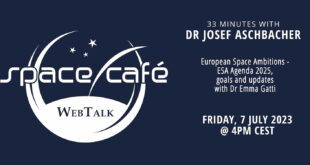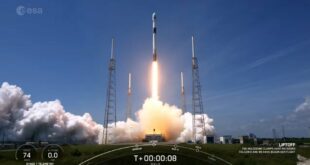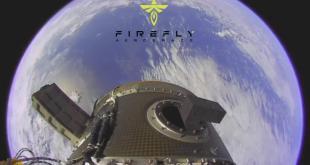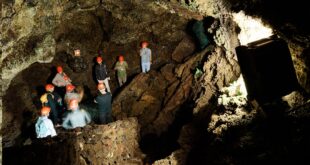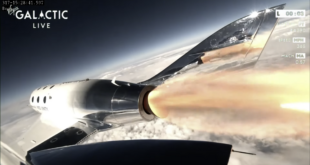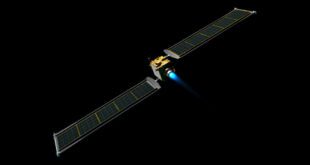The European Union Agency for the Space Program (EUSPA), as of 1 July, will begin operating the Space Surveillance and Tracking (SST) Front Desk, following a European Commission’s Decision of 3 June 2022. This follows the European Union's objective to take a holistic approach to Space Traffic Management to address the issue of space congestion.
Read More »Space Cafè Radio – with Niklas Nienass, MEP
In this Space Café Radio - SpaceWatch.Global publisher Torsten Kriening spoke with Niklas Nienass, Member of the European Parliament for The Greens/ European Free Alliance, about GLOC - the Global Space Conference on Climate Change in Oslo in May 2023 and about the challenges in climate change where space can be part of the solution. They also covered the current status of the European Space Law and the new study about life-cycle assessments for space missions.
Read More »Register Today for next Space Café WebTalk – “33 minutes with Dr Josef Aschbacher” on 7 July 2023
This Space Café WebTalk will feature Dr. Josef Aschbacher, Director General of the European Space Agency - ESA, in conversation with Dr. Emma Gatti, Editor-in-Chief of SpaceWatch.Global. For over four decades, the European Space Agency (ESA), alongside its member states and associated industries, has been instrumental in spearheading numerous triumphs in European space exploration. To keep pace with changing circumstances, ESA has deftly refined its rules, procedures, and governance structure. Its demonstrated flexibility in adapting as needed constitutes a valuable asset.
Read More »ESA and CNES signs MoU to Support SpaceFounders
The National Centre for Space Studies (CNES) and the European Space Agency (ESA) have inked a Memorandum of Understanding, marking ESA's support of the SpaceFounders program. This strategic alliance sends a strong signal about the increasing dialogue and proximity between leading space institutions and startups, a significant step towards a stronger and more innovative European space industry.
Read More »Euclid Launches to Space to Study Dark Matter
The European Space Agency has launched the Euclid Space Telescope, an orbital telescope built to shed light on mysterious cosmic phenomena known as dark energy and dark matter. The space telescope launched aboard a Falcon 9 rocket at 11 a.m. EDT (1500 GMT) from Cape Canaveral Space Force Station, Florida, United States of America. The mission has cost about $1.4 billion and has a design lifespan of about six years. Furthermore, the Agency expects it to transform astrophysics and potentially the understanding of the very nature of gravity itself.
Read More »Firefly Aerospace Partners Lockheed Martin for Launch Services
Firefly Aerospace, Inc. has announced it signed a launch agreement with Lockheed Martin to support a technology demonstration mission that will launch aboard Firefly's Alpha vehicle. This is as Firefly's Alpha rocket provides launch services with the capability to lift more than 1,000 kg to low Earth orbit. The vehicle utilizes Firefly's patented tap-off cycle propulsion technology and carbon composite sandwich structures to reduce mass and costs and improve strength and reliability.
Read More »#SpaceWatchGL Opinion: Building the Future of Space, Ocean, Earth Collaborative Research
In Portugal, the Institute of Systems and Computer Engineering, Technology and Science (INESC TEC) is seeking new ways to apply scientific action to support solutions both in space and on Earth.
Read More »Virgin Galactic Completes Inaugural Commercial Spaceflight
Virgin Galactic has successfully completed its inaugural commercial spaceflight from Spaceport America in New Mexico. The Galactic 01 spaceflight carried 13 research payloads and three crew members from the Italian Air Force and the National Research Council of Italy. The spaceflight took off at 8:30 am MT (14:30 GMT), rising to an altitude at release at 44,500 feet. The flight's apogee was 52.9 miles, the top speed was Mach 2.88, and the landing time was 9:42 am MT (15:42 GMT).
Read More »Asteroid Day: TRAD committed to DART mission
As today, June 30, is International Asteroid Day, Test and Radiation (TRAD) is taking the opportunity to look back at its contribution to the DART mission. DART, or Double Asteroid Redirection Test, was a C-class mission of NASA. It was the very first mission dedicated to the study and demonstration of an asteroid deflection method. Furthermore, the mission's objective was to evaluate the use of a spacecraft's kinetic impact to modify the asteroid's trajectory so that it avoids the Earth.
Read More »AIRMO Secures €5.2M in Pre-Seed Funding
AIRMO, an American start-up providing close to real-time data on CH4 and CO2 emissions, announced its pre-seed round of €5.2 million. The round consists of money from investors as well as a €3.7 million contract by the European Space Agency through its InCubed co-funding program run by the ESA Φ-lab. This pre-seed round will enable AIRMO to launch its first of twelve satellites into orbit.
Read More » SpaceWatch.Global An independent perspective on space
SpaceWatch.Global An independent perspective on space



